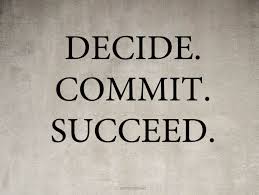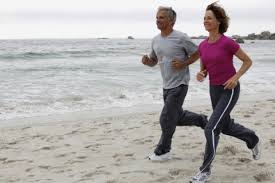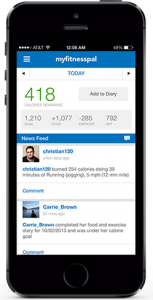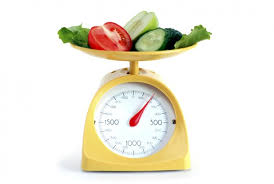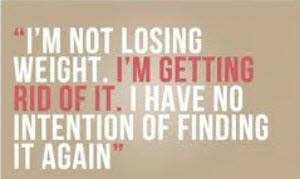Do you struggle with losing weight?
 How many of us (myself included) have struggled with losing weight and keeping it off?
How many of us (myself included) have struggled with losing weight and keeping it off?
If you believe the media, it’s very difficult to do.
Rule #1 – Don’t believe the media!
I get very inspired by our clients.
It’s not uncommon to see at least one person each week who has reduced their weight by somewhere between 8-12 kgs over a 6-12 month period. This even includes people in their 70s!
How do they do it?
1. They make a real decision to lose weight. The decision is important – it has to move from your head to your heart.
2. They almost always follow some form of strategy or plan.
3. The strategy primarily involves ingesting fewer calories/kilojoules (1 calorie = 4.2 kilojoules).
4. They monitor constantly with scales so that they can adjust their behaviour based upon the outcome being achieved.
Exercise alone is not the answer
I don’t think I’ve ever seen anyone lose weight through exercise alone – it’s just too time consuming.
It takes about 45 minutes to burn up 1000 kJs which is equivalent to a handful of nuts or 2 small slices of bread.
In fact, we have one patient who lost 40 kgs and didn’t do an iota of exercise.
No ‘one’ diet is better than another
The 5:3 vs. Palaeolithic vs. Mediterranean etc – they ALL work if you stick to them and you reduce calories. I’m talking quantity of calories here – not quality.
Mediterranean Diet
The Mediterranean Diet, which I recommend to ALL of our clients, focuses on the types of food that will reduce heart attack rates based upon sound evidence.
The Mediterranean Diet is not designed to be a weight-loss diet, although it would be very difficult to be significantly overweight following this regime.
Weight loss is simple maths
- One kilogram of fat = 30,000 kJs of energy.
- Therefore if you put yourself into a deficit of 1,000 kJs a day for 30 days you WILL lose 1 kg.
- Do it for 12 months and you will lose 12 kgs.
Jessica Irvine, a SMH economist, wrote some very elegant articles on the mathematics of weight loss and how it helped her lose 20 kgs.
If you would like a copy of the article, please request a copy by email.
Exercise and weight loss
If you exercise you will turbo charge the weight loss, but you can’t exercise overweight away without changing what you eat.
Exercise will burn calories but it takes time to do it this way and many of us in our culture don’t have that much time.
What is quicker… not having 2 medium sized baked potatoes or walking for an hour to burn up the equivalent calories?
How can you manage your food intake?
I advocate a free “app” called MyFitnessPal.
Download it, put in your age, level of activity, gender, current and desired weight and it will tell you your estimated kilojoule/calorie daily input.
Then each and every time you eat anything, you open the app and fill in what you ate. Because the app has internet “search-ability”, as the day progresses you can track your calorie/kJ intake and end up the day hitting your desired goal.
Note: If you exercise, you also enter those details as it will offset some of the food you have eaten.
Some of our politicians use MyFitnessPal too.
What will you need to do?
• Yes, you will need to read some labels to see how many calories you are ingesting.
• Yes, you will need to weigh food occasionally.
• Yes, you may well be shocked when you realise how many calories you are REALLY ingesting and where they are coming from.
But, IF YOU FOLLOW THIS, or any other strategy that gets you to a calorie deficit each day consistently (not occasionally), it will work.
If you follow this genuinely and it isn’t working as it should, and you are honest and diligent with it, then your “set-point” for weight loss is a lower daily kJ intake than suggested by the app and you need to reduce your intake further until the weight loss kicks in.
99% of successful weight loss is behavioural
Is this simple? Yes. There are very few principles to follow.
Is it easy? No! It requires focus and discipline. What you’ve read above is all you need to know.
To learn more ….
